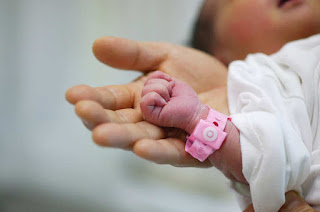 |
| image credit: health.economictimes.indiatimes.com |
Regular early head circumference assessments add valuable information when screening for long-term neurocognitive risk – according to new research by an international research collaboration, including the University of Warwick, UK and the University of Tennessee Knoxville, US.
The researchers found that a method as simple and cost effective as frequently measuring head size adds valuable information when screening for long-term neurocognitive risk.
The research published in Journal of the International Neuropsychological Society examined the development of children who are born very preterm and/or very low birth weight who tend to have a lower head circumference at birth, and if their heads don't grow sufficiently their IQ development might be impaired.
203 VP/VLBW (under 32 weeks gestational age and/or under 1500g) and 198 term born children (between 37 and 41 weeks gestation) were followed in Germany born in 1985-6 into adulthood.
Co-researchers Dr. Dieter Wolke and Dr. Julia Jaekel measured the head circumference at birth, 5 months, 20 months and 4 years of age. Intelligence was assessed with standardised tests in childhood – 6 and 8 years, and at 26 years.
The researchers found that a method as simple and cost effective as frequently measuring head size adds valuable information when screening for long-term neurocognitive risk.
The research published in Journal of the International Neuropsychological Society examined the development of children who are born very preterm and/or very low birth weight who tend to have a lower head circumference at birth, and if their heads don't grow sufficiently their IQ development might be impaired.
203 VP/VLBW (under 32 weeks gestational age and/or under 1500g) and 198 term born children (between 37 and 41 weeks gestation) were followed in Germany born in 1985-6 into adulthood.
Co-researchers Dr. Dieter Wolke and Dr. Julia Jaekel measured the head circumference at birth, 5 months, 20 months and 4 years of age. Intelligence was assessed with standardised tests in childhood – 6 and 8 years, and at 26 years.
They found that VP and VLBW infants had smaller heads at birth, but between birth and 20 months their heads grew relatively faster than that of term born children because they had to catch up.
Professor Dieter Wolke, from the Department of Psychology and Warwick Medical School at the University of Warwick is a senior author in the report, 'Head growth and intelligence from birth to adulthood in very preterm and term born individuals.' He comments:
"Measuring head circumference and thus head growth in early childhood is a proxy measure of brain volume growth in early childhood. It is simple and cheap to do and as shown in our research, slow head growth is a specific warning sign for potential neurocognitive problems."
Dr. Julia Jaekel, the first author from the University of Tennessee said:
"Those who showed faster head growth, whether preterm or term born, had higher intelligence scores at 26 years. Catch-up head growth was particularly beneficial for intelligence scores in VP and VLBW children. It was a better predictor than how early or at what birth weight infants were born."
This research shows that head growth is a proxy measure of brain volume growth and is linked with long-term cognitive development. Monitoring the development of head growth, in particular in VP and VLBW infants, assists in the assessment of neurocognitive risks later in life.
The next step for researchers is to investigate how to assist with head growth and thus brain development in VP and VLBW children. Some of these targets for improvement are nutrition and eating, neuro-protective treatments, and appropriate cognitive and emotional stimulation as brain food.
More information: Julia Jaekel et al. Head Growth and Intelligence from Birth to Adulthood in Very Preterm and Term Born Individuals, Journal of the International Neuropsychological Society (2018). DOI: 10.1017/S135561771800084X
Source: medicalxpress.com
We tried to get pregnant for a few years in a local clinic. There were no results. We've tried everything possible but nothing. We were recommended to use donor eggs. I knew we have to try herbal made medicine. I was terrified. I didn't know how to go about it and where to begin my search. When my friend recommended me to Dr Itua herbal medicine in Western African. I thought she was joking. I knew nothing about that country and I was afraid with shame I must say I thought it was a little bit...wild? Anyway she convinced me to at least check it out. I've done the research and thought that maybe this really is a good idea. Dr Itua has reasonable prices. Also it has high rates of successful treatments. Plus it uses Natural Herbs. Well I should say I was convinced. I and My Husband give a try and now we can say it was the best decision in our lives. We were trying for so long to have a child and suddenly it all looked so simple. The doctors and staff were so confident and hopeful they projected those feelings on me too. I am so happy to be a mother and eternally thankful to Dr Itua and Lori My Dear Friend. Don’t be afraid and just do it! Try Dr itua herbal medicine today and sees different in every situaton.Dr Itua Contact Info...Whatsapp+2348149277967/drituaherbalcenter@gmail.com Dr Itua have cure for the following diseases.All types of cancer,Liver/Kidney inflamatory,Fibroid,Infertility.Diabetes,Herpes Virus.
ReplyDelete